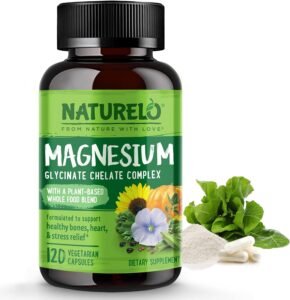Have you ever wondered what magnesium glycinate can do for you? If you’re looking into supplements and considering magnesium glycinate, you’re likely curious about its benefits, what sets it apart, and how it might enhance your health and well-being.
Table of Contents
ToggleUnderstanding Magnesium
Before diving into magnesium glycinate specifically, it’s essential to understand what magnesium itself is and why it’s crucial for your body. Magnesium is a mineral that plays a pivotal role in numerous bodily functions. From muscle and nerve function to blood glucose control and blood pressure regulation, magnesium is indispensable to your health.
Importance of Magnesium in the Body
Magnesium is a cofactor in more than 300 enzymatic reactions. Here are some of the critical roles it plays:
- Energy Production: ATP, the energy currency of cells, requires magnesium for its activation.
- Protein Synthesis: It helps in creating proteins from amino acids.
- Muscle and Nerve Function: It aids in muscle contraction and relaxation, as well as nerve impulse conduction.
- Bone Health: Alongside calcium and vitamin D, magnesium is vital for bone structure and strength.
Common Sources of Magnesium
While magnesium is found naturally in many foods, such as leafy green vegetables, nuts, seeds, and whole grains, many people still fall short of the recommended daily intake. This is where supplementation comes into play.
Why Magnesium Glycinate?
Magnesium supplements come in various forms, including magnesium citrate, oxide, chloride, and glycinate. Among these, magnesium glycinate is particularly noteworthy for several reasons.
What Sets Magnesium Glycinate Apart
Magnesium glycinate comprises magnesium and glycine, an amino acid. This combination makes it one of the most bioavailable and absorbable forms of magnesium.
Enhanced Absorption
Glycine is an easily absorbable amino acid that aids in transporting magnesium through the intestinal walls, ensuring you get more bang for your buck in terms of absorption.
Reduced Gastrointestinal Issues
Unlike other forms of magnesium that may cause digestive issues such as diarrhea (for example, magnesium oxide), magnesium glycinate is gentler on your stomach. This makes it an ideal option for those with sensitive digestive systems.
Benefits Specific to Glycine
Glycine itself is known for its benefits to mental health, sleep quality, and overall well-being. When bound to magnesium, its effects are magnified, offering a synergistic blend of benefits.
Health Benefits of Magnesium Glycinate
Now, let’s get into the meat of the matter — what magnesium glycinate can do for you.
Improved Sleep Quality
Magnesium and glycine both play roles in sleep health. Magnesium has been shown to help improve insomnia symptoms, while glycine can contribute to better sleep by lowering core body temperature and optimizing sleep cycles.
Studies Confirming Sleep Benefits
Research has demonstrated that magnesium supplementation can increase sleep time and efficiency. A study published in the Journal of Research in Medical Sciences highlighted that magnesium improved sleep patterns in older adults.
Reduced Anxiety and Improved Mood
Both magnesium and glycine have calming effects on the nervous system. Magnesium regulates neurotransmitters involved in mood, while glycine acts as an inhibitory neurotransmitter, reducing brain activity associated with stress.
Evidence Supporting Mood Enhancement
A study in the Journal of the American Board of Family Medicine found that magnesium supplementation significantly reduced symptoms of depression. Furthermore, glycine’s calming properties contribute to this effect, making magnesium glycinate a dual-action mood stabilizer.
Enhanced Bone Health
Magnesium is essential for maintaining bone density, aiding in the activation of vitamin D and regulating calcium levels. As a highly absorbable form of magnesium, magnesium glycinate ensures you receive the maximum benefits for your bones.
Supporting Research
Multiple studies have shown that adequate magnesium levels correlate with better bone density and reduced risk of osteoporosis. In essence, ensuring you get enough magnesium glycinate can contribute to stronger, healthier bones.
Better Muscle Function and Reduced Cramps
Since magnesium plays a key role in muscle function, a deficiency can result in cramps and spasms. Magnesium glycinate helps to relieve these symptoms by aiding in muscle relaxation and reducing inflammation.
Clinical Findings
Research has suggested that magnesium supplements can be particularly beneficial for athletes or individuals experiencing frequent muscle cramps. A study in Muscle & Nerve found that magnesium supplementation helped reduce cramps in participants.
Blood Sugar Regulation
Magnesium is essential for insulin function and glucose metabolism. Ensuring adequate intake can help manage blood sugar levels and reduce the risk of developing type 2 diabetes.
Research on Blood Sugar
Studies published in Diabetes Care have shown that people with higher magnesium intakes have a lower risk of developing diabetes. Magnesium glycinate, being highly absorbable, can be especially effective in this regard.
Cardiovascular Health
Magnesium aids in maintaining a healthy heart rhythm and blood pressure. It also plays a part in managing levels of other essential minerals, such as potassium and calcium, which are critical for heart health.
Scientific Support
A study in the American Journal of Clinical Nutrition indicated that higher magnesium intake was associated with a lower risk of cardiovascular disease. Given its good absorption, magnesium glycinate can be an excellent choice for heart health.
How to Take Magnesium Glycinate
Understanding the benefits is one thing, but knowing how to incorporate this supplement into your routine is equally important.
Recommended Dosage
The Recommended Dietary Allowance (RDA) for magnesium varies by age, gender, and life stage. Generally, adult men need around 400-420 mg per day, whereas adult women require about 310-320 mg daily. For specific conditions, higher doses might be suggested, but it’s always best to consult with a healthcare provider.
Best Time to Take Magnesium Glycinate
Magnesium glycinate can be taken with or without food. Many people find it beneficial to take it in the evening, given its role in promoting relaxation and better sleep.
Potential Side Effects
Although magnesium glycinate is well-tolerated, excessive intake can result in side effects such as diarrhea, nausea, and abdominal cramping. Always adhere to the recommended dosage and seek medical advice if you’re unsure.

Comparing Magnesium Glycinate to Other Forms
With multiple forms of magnesium supplements available, it’s helpful to understand how magnesium glycinate stacks up against others.
Magnesium Citrate
Magnesium citrate is another highly absorbable form but often used as a laxative. While it’s effective for treating constipation, it may not be suitable for long-term use, especially if you’re looking to avoid gastrointestinal issues.
Magnesium Oxide
This form contains a high percentage of elemental magnesium but is poorly absorbed by the body. It’s more likely to cause digestive issues and is typically used to relieve short-term deficiencies only.
Magnesium Chloride
Though absorbable, magnesium chloride is generally used in topical applications for relief of muscle soreness and not often recommended for oral supplementation due to its laxative effects.
Magnesium Malate
This form is known for its benefits in combating fatigue, particularly useful for individuals with chronic fatigue syndrome. It’s well-absorbed but typically used for very specific health conditions.
Comparative Absorption Rates
| Form | Absorption Rate | Common Issues |
|---|---|---|
| Magnesium Glycinate | High | Minimal gastrointestinal discomfort |
| Magnesium Citrate | High | Potential laxative effect |
| Magnesium Oxide | Low | Poor absorption, digestive issues |
| Magnesium Chloride | Moderate | Laxative effect, typically topical |
| Magnesium Malate | High | Specialized use for fatigue recovery |
Who Should Consider Magnesium Glycinate?
While magnesium glycinate offers an array of benefits, it’s particularly advantageous for certain individuals.
People with Magnesium Deficiency
Those who are deficient in magnesium can benefit significantly from magnesium glycinate due to its high absorption rate and minimal side effects.
Athletes
Athletes may need more magnesium due to increased physical activity, which can deplete magnesium stores more rapidly.
Individuals with Chronic Stress
Given its calming effects on the nervous system, magnesium glycinate can be particularly helpful for people dealing with chronic stress or anxiety.
Older Adults
As you age, your body’s ability to absorb nutrients decreases. Magnesium glycinate is an excellent option for older adults to ensure they’re maintaining adequate magnesium levels.

Incorporating Magnesium Glycinate into a Healthy Lifestyle
While magnesium glycinate can bring significant benefits, it’s most effective when integrated into a broader approach to health.
Balanced Diet
Aim for a diet rich in magnesium-containing foods such as leafy greens, nuts, seeds, and whole grains. Supplementation can help fill the gaps, but natural sources are always best.
Regular Exercise
Exercise can deplete your magnesium levels, so it’s essential to maintain balance through both diet and supplementation.
Stress Management
Practices such as mindfulness, meditation, and adequate sleep all contribute to overall well-being and can enhance the benefits of magnesium glycinate.
Regular Check-Ups
Consult with your healthcare provider to monitor your magnesium levels and adjust your supplementation as necessary. Individual needs can vary widely, so personalized advice is invaluable.
Concluding Thoughts
Magnesium glycinate stands out as a highly absorbable and well-tolerated form of magnesium supplementation. Whether you’re seeking to improve your sleep, reduce anxiety, enhance bone health, or maintain optimal muscle function, magnesium glycinate offers a range of benefits tailored to support your body’s needs. As always, incorporating supplementation into a balanced lifestyle with a nutritious diet, regular exercise, and stress management strategies will provide the most comprehensive health benefits.
So, the next time you find yourself pondering the question, “What does magnesium glycinate do for you?” remember this: it offers a unique combination of high absorption, gentle digestion, and a multitude of health benefits that can significantly enhance your quality of life.




